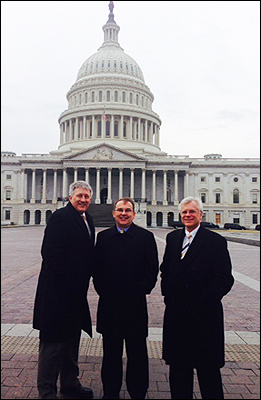Vanderbilt Engineering Dean Philippe Fauchet participated in the American Society for Engineering Education (ASEE) public policy colloquium in Washington, D.C. Feb. 11-12.
This annual event brings more than 100 engineering deans from across the country to the nation’s Capitol to talk about the issues most pressing to these academic leaders.
The full-day conference on Tuesday began with a welcome from ASEE President Kenneth F. Galloway, Distinguished Professor of Engineering and former dean of Vanderbilt’s School of Engineering.
Galloway’s remarks were followed by conversations about the outlook for research funding in the FY 15 budget, ways to strengthen and diversify the STEM pipeline and national manufacturing initiatives. Speakers included Jeff Mervis, staff writer at Science Magazine; Michael Molnar, chief manufacturing officer at NIST; Tom Kahil, deputy director for technology and innovation at the Office of Science and Technology Policy; and James Brown, executive director of the STEM Ed coalition.

Following this session, the deans prepared for their day on Capitol Hill. The Capitol Hill advocacy day Wednesday began with several panel discussions at the Capitol Visitor Center where key Capitol Hill staff shared their priorities and predictions for the reauthorization of the America COMPETES Act, the outlook for immigration reform including high-skilled workers, and the status of several federal manufacturing initiatives.
Several members of Congress also spoke to the deans. Rep. Dana Rohrabacher(R-Calif.), a member of the Science, Space and Technology Committee, shared his thoughts regarding the America COMPETES Act and Sens. Sherrod Brown(D-Ohio) and Roy Blunt(R-Mo.) discussed their bipartisan legislation, the “Revitalize American Manufacturing and Innovation Act of 2013,” which would establish a Network for Manufacturing Innovation.
On Wednesday Dean Fauchet, accompanied by Dean Joseph Rencis of Tennessee Tech’s School of Engineering and Dean Richard Swiegard of the University of Memphis’ Herff School of Engineering, visited with the staff of Tennessee legislators: Sens. Lamar Alexander(R) and Bob Corker(R), as well as staff in the offices of Reps. Jim Cooper(D), Steve Cohen(D) and Diane Black(R).
In these meetings the deans highlighted the importance of federally-funded basic research, the ways in which their institutions contribute to economic growth in Tennessee and initiatives they are working on to strengthen the STEM pipeline.
The deans emphasized their position at the nexus of STEM education – they must work to spark interest in middle and high school students while also ensuring that current students complete their degrees, prepared to tackle our nation’s newest innovation and design challenges.
Reactions by staff to their priorities were very positive, the deans said. “They clearly understand the important role that engineering schools play in preparing the next generation of innovators, while also promoting economic growth and job creation,” Fauchet said.
Fauchet highlighted Vanderbilt’s K-12 outreach efforts through the Tennessee Solar Conversion and Storage using Outreach, Research and Education (TN-SCORE) grant, and the newly announced Engineering Ambassadors Network program. This program will establish an outreach program to train undergraduate and graduate students to serve as engineering ambassadors who will work to encourage middle and high school students to pursue careers in engineering. The National Science Foundation supports both TN-SCORE and the ambassadors program.
As the FY 15 budget process moves forward, Vanderbilt’s Office of Federal Relations will continue to work closely with the Tennessee delegation to ensure that these key budget and policies priorities are addressed.